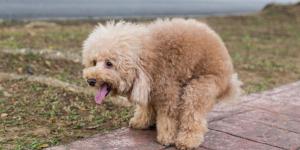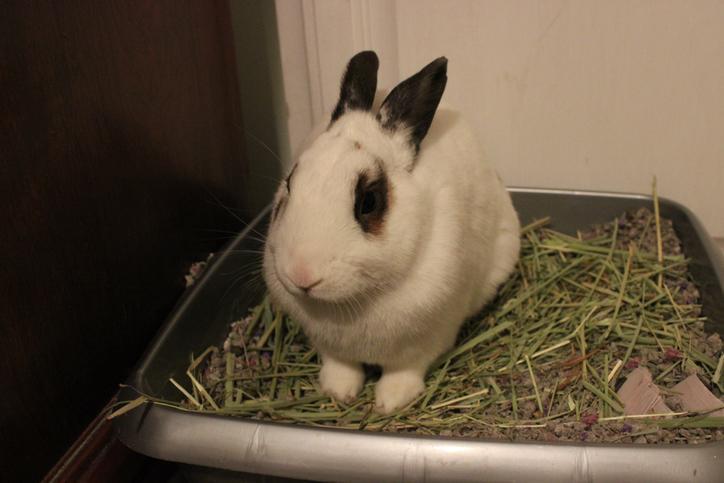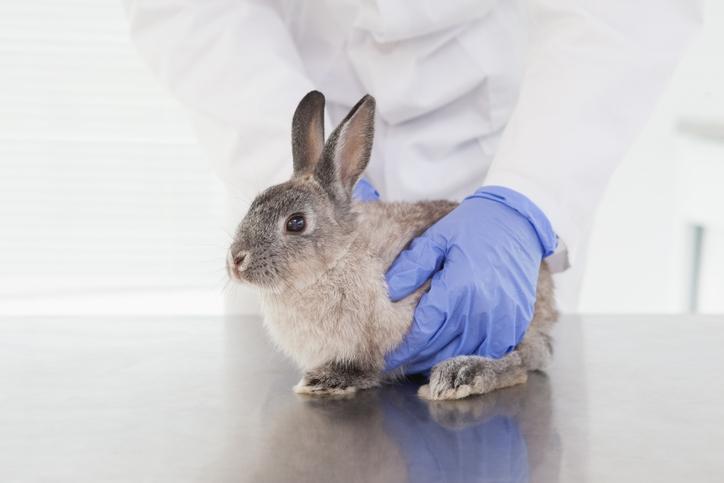Rabbit Constipation

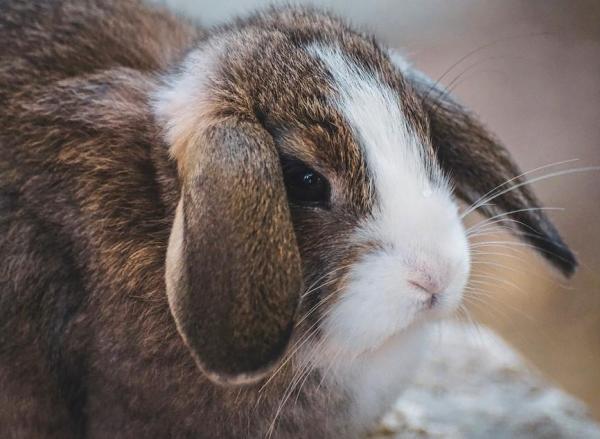

See files for Rabbits
It is easy to overlook rabbit constipation, because your rabbit may not show alarming symptoms, or may show symptoms that are difficult to recognize. This is why it is important to pay attention to your rabbit and make sure they are defecating regularly and without difficulty. Although constipation is generally considered a minor disorder, the truth is that in rabbits it can often be fatal. Constipation in rabbits is caused by intestinal blockage, also known as gastrointestinal (GI) stasis or rabbit ileus. This is a very serious problem and it occurs relatively frequently.
There are several possible reasons a rabbit can become constipated, but remember that this is always a medical emergency and requires veterinary treatment. Keep reading this AnimalWised article to find out all you need to know about rabbit constipation - symptoms and treatment.
Causes of rabbit constipation
There are several causes that for constipation or intestinal blockage in rabbits. Only a veterinarian can make an accurate diagnosis. However, here are some of the possible reasons your rabbit is constipated:
- Inadequate diet: Most often, rabbit constipation is the result of poor diet, which is why you should make sure you are giving your rabbit a healthy and suitable diet. Excess carbohydrates or proteins are often at fault. As we explain in this article on how much a rabbit should eat, a rabbit's diet should be based on fresh green foods, abundant hay and a very small amount of dry or processed pellets. Here is another article on recommended fruits and vegetables for rabbits, to give you an idea of what to feed your pet. Giving it with enough hay is also important. The hay provides necessary fiber to keep the rabbit's digestive tract functioning smoothly.
- Changes in diet: an abrupt change in foods or feeding patterns can also cause your rabbit to stop eating or become constipated. If you want to introduce new foods or change your rabbit's diet, introduce changes gradually to give the rabbit time to get used to them.
- Dehydration: dehydration is also of serious concern in rabbits. One of the side effects of dehydration is hypomotility or a slowing down of the digestive tract, which stops it from working smoothly. This leads to blockages and produces constipation. Here is an article with more information on water for rabbits.
- Poisoning: your rabbit may have eaten tainted food or foods that are toxic for rabbits. These can cause serious digestive problems, making defecation difficult and causing the rabbit constipation.
- Dental/oral infections: if your rabbit suffers from dental problems or oral infections such as abscesses it may stop eating, leading to constipation.
- Stress: in the wild a rabbit is an animal of prey. Therefore, they are sensitive and naturally prone to anxiety or stress. Increases in noise levels, shifting to a new home, or the presence of other animals are just some of the factors can that make your rabbit feel afraid. This can cause bowel movements to stop due to the stress. Here is an article on signs of stress in rabbits, which can help you identify if your rabbit is suffering from stress.
- Pain: pain caused by other health problems can also lead to constipation in your rabbit. In this case, the veterinarian will probably prescribe painkillers for your furry friend. If you are unsure of how to recognize the signs of pain in rabbits, we recommend you consult this article on how to know if your rabbit is in pain.
- Abdominal adhesion: if your rabbit has gone through abdominal surgery, constipation may occur, post-surgery, due to abdominal adhesion. This could cause intestinal blockage or GI stasis. If your rabbit seems to be suffering from constipation post-surgery, consult your vet as soon as possible.
Risks of GI stasis in rabbits
Constipation and GI stasis in rabbits require veterinary attention. If your rabbit defecates but the pellets are very small, hard, or appear unusual, you should still seek professional help. Constipation can be total or partial, so pay attention to any changes in your rabbit's feces.
As we have mentioned, rabbit constipation is caused by intestinal blockage or GI stasis. Here are some specific ways in which GI stasis can manifest:
- Hypomotility: this refers to a condition in which there is a slowing down of movement in the rabbit's gastrointestinal tract. This means that food and hair pass too slowly through the rabbit's digestive system, or get stuck there leading to GI stasis and constipation. Hypomotility can be caused by inadequate diet, dehydration or other diseases.
- Obstructions: constipation in rabbits sometimes involves the physical obstruction of the gastrointestinal tract by objects such as hairballs (trichobezoars). Rabbits ingest hair when grooming themselves, and if they have a healthy diet with enough fiber, the hair normally passes through their system with no complications. If your rabbit cannot process the hairballs due to other underlying health conditions, these lump together with undigested food blocking the rabbit's intestines and causing constipation. If your rabbit ingests a foreign substance such as carpet fiber this could also cause obstructions in its gastrointestinal tract.
Due to the characteristics of the rabbit's digestive system, hypomotility and constipation have an impact on glucose levels, causing hypoglycemia in rabbits. This in turn can result in hepatic lipidosis and the rabbit's death. This is why both partial or total constipation is considered a serious condition in rabbits, requiring urgent medical attention. At the first sign of constipation or blockage in your rabbit you should take it to the veterinarian at once. This may be crucial to saving your rabbit's life.
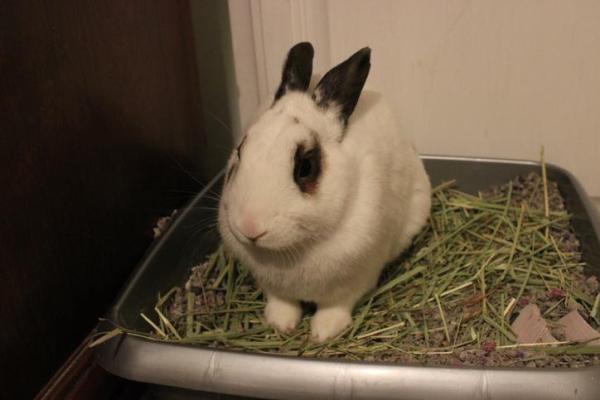
Symptoms of rabbit constipation
The most common sign that your rabbit is constipated is, of course, if it stops defecting or is defecating less than normal (in smaller pellets, for example). Apart from your rabbit appearing constipated here are some other key symptoms of GI stasis to keep an eye out for. If you notice any of these, contact a veterinarian immediately.
- Abdominal swelling
- Gases
- Anorexia or not eating
- Dehydration
- Lethargy
- Hunched posture
- Thick Saliva
- Decreased urination
- If there are feces: usual pellets that may be covered in a whitish mucus.
If your rabbit does not defecate at all for more than 12 hours, you must take it to the veterinarianimmediately. As we have mentioned, a complete lack of bowel movements in your rabbit could be fatal to the animal. A trained professional will be able to treat it properly in the emergency room.
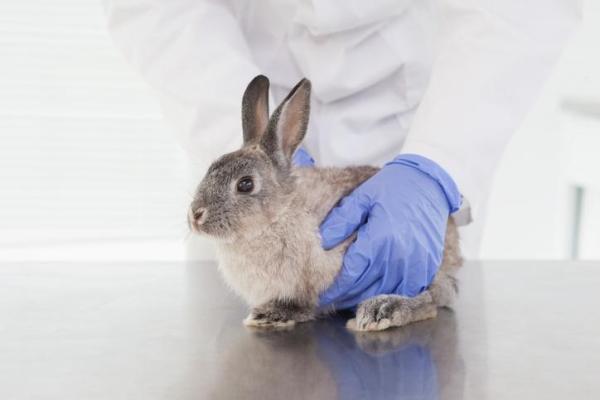
Treatment of rabbit constipation
When there is more than one possible cause for your rabbit's constipation, the veterinarian will ask specific questions about their living conditions, the symptoms you have noticed, and any changes in their routine. The vet will examine and palpate the rabbit's abdomen to determine the cause of constipation. An x-ray may be necessary to better observe the state of the rabbit's digestive tract, although sometimes obstructions do not appear on an x-ray. The vet may also decide to carry out an ultrasound. Finally, a blood test may be recommended to obtain general information about your rabbit's health.
Medication and remedies for constipation in rabbits
Medication and treatment for constipation or GI stasis in a rabbit will largely depend on the rabbit's health and the underlying causes of constipation. Here are some of the possible treatment options your vet may recommend:
- Treatment of diseases: if a particular disease is causing your rabbit constipation, the veterinarian will prescribe specific treatments to combat the disease as well as the constipation. Here is a list of some common diseases in rabbits.
- Intestinal motility drugs: to stimulate gut motility, the vet may prescribe medication for rabbits designed to reactivate the digestive tract. Massages and light physical activity will also facilitate your rabbit's bowel movements.
- Fluid treatment: in severe cases, the vet may choose intravenous or intraosseous administration of fluids, since good hydration is essential for healthy bowel movement. Is less critical cases, fluids can also be injected subcutaneously or administered orally using a nasogastric tube. It is essential that the rabbit continues to eat during this time. The veterinarian may decide to feed the rabbit using a tube or syringe, and will give it with a special formula meant for rabbits in this condition.
- Analgesics and gas medication: if the rabbit is under a lot of pain, the vet may prescribe an analgesic, and drugs to treat gases in the rabbit's abdomen. Of course, they will also give you suggestions for an adequate and fiber-rich diet to prevent your rabbit from getting constipated again.
- Antibiotics: in some cases antibiotics are prescribed because constipation increases intestinal bacteria, which could lead to infections that aggravate the rabbit's condition. Antibiotics are not usually recommended, as they also destroy healthy gut bacteria, and the vet should only prescribe them if absolutely necessary.
- Gastroprotectants: gastroprotectants are drugs used to prevent ulcers that often develop as a side effect of constipation in rabbits. Ulcers complicate a rabbit's ability to recover as they can perforate the stomach lining and cause peritonitis.
- Natural laxatives: in the case of hairballs that have formed during GI stasis, malt paste for cats, or natural pineapple juice may be given to rabbits. They have a natural laxative effect and re-hydrate the digestive tract. This can help help break up the mass formed in the rabbit's gut and allow it to eliminate accumulated feces.
- Surgery: if the rabbit does not improve with medical treatments, your vet may suggest surgery as a final option. In this case, the prognostic is uncertain. Gastrointestinal surgery on rabbits tend to have a low success rate and should be considered only as a last resort.
Once the rabbit recovers, following a correct diet, giving it sufficient exercise, and minimizing stress triggers will be key to maintaining your bunny's intestinal health. After all, as with most conditions, prevention is the best cure for rabbit constipation.
Watch the AnimalWised video below to learn about the best diet for rabbits.

This article is purely informative. AnimalWised does not have the authority to prescribe any veterinary treatment or create a diagnosis. We invite you to take your pet to the veterinarian if they are suffering from any condition or pain.
If you want to read similar articles to Rabbit Constipation, we recommend you visit our Intestinal problems category.
- Brotóns, N., and Blasco, M. (2004). Gastrointestinal hypomotility in rabbits: 7 clinical cases. A.V.E.P.A Magazine, 24(4), 211-219.
- Teso, B., and Barbero, S. (2017). Digestive problems in rabbits: rabbit ileus. Ateuves 48, 28-34.


